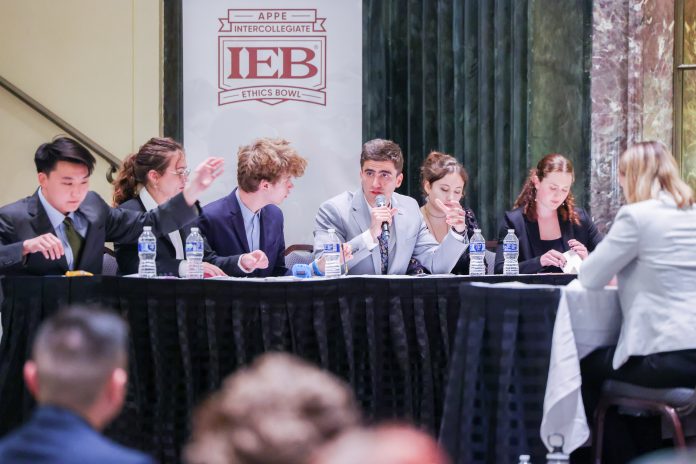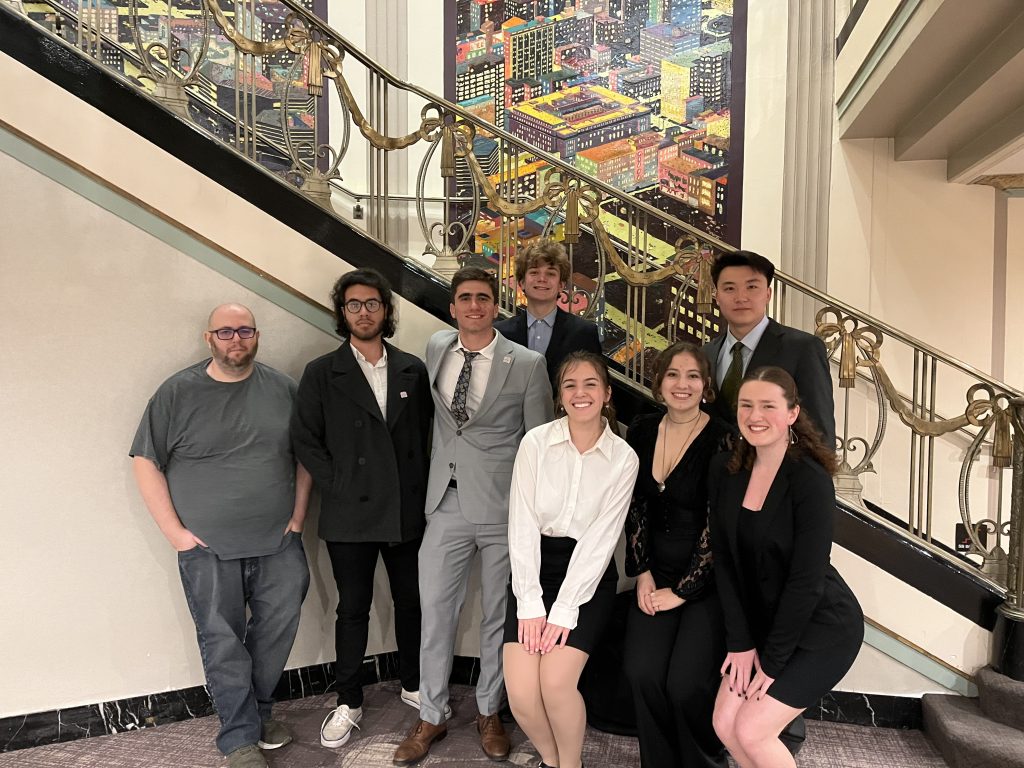
Tia Trinh
Executive Content Editor
From Feb. 24 and 25, the UC Santa Barbara (UCSB) Ethics Bowl team competed at the national competition for the Association for Practical and Professional Ethics Intercollegiate Ethics Bowl (APPE IEB). The team of undergraduates, Isabelle Brady, Natalie Ries, Chaya Haugland, Enri Lala, James Wangjin Xie, and Griffin Baxley were joined by graduate coaches David King and Jon Charry to face off against a series of formidable opponents and “big name” universities in academia. After facing University of North Carolina (UNC) at Chapel Hill in the final round, they took home second place.
The national competition saw 36 schools across the nation engaging students in critical discussions on the ethics of a variety of cases including the ones that UNC Chapel Hill and UCSB wrestled with in the final round: limits to Artificial Intelligence (AI) and affirmative action at colleges and universities, respectively.
The Bottom Line (TBL) sat down with the team and coach David King to learn more about their journey in Ethics Bowl and how they, both as individuals and as a team, have come to love what they do. As contagious laughter erupted across the room, the team enthusiastically recounted their experience at the competition.
Ethics Bowl, as the team explained, is essentially a conversation. Instead of being assigned a stance, the team constructs their own argument to present to both the opposing team and the judges. In a press release APPE Council Chair John Garcia wrote that the competing teams’ arguments, presentations, and exchanges are evaluated “by their ability to identify and analyze the ethical dimensions of each case in a clear, focused, and thoughtful manner and with an appreciation for varied perspectives.”
But the intensity of the competition is just as apparent, and the effort poured into preparing for the competitions is found in the long hours of debates and practice in the UCSB Philosophy Common Room. Natalie Ries, a third-year double majoring in philosophy and sociology explained, “Our team really puts a lot of emphasis on understanding the philosophy as opposed to simply being super polished. We really want to know what we’re talking about and be able to argue that well.” Bringing this mindset into the national competition paid off in their climb to the final round.
Their initial winning streak was unexpected to both them and everyone else in the competition. Griffin Baxley, the only first-year on the team noted, “We were confident in our abilities, but we understood that it was going to be a serious challenge.” Their preliminary schedule consisted of Yale, the U.S. Naval Academy — the reigning national champions — University of Maryland, Baltimore County (UMBC) and UChicago; all four teams had reached the quarterfinals the previous year. Each team member recounted the heart-dropping feeling of seeing their initial opponents, only for it to be followed by sympathetic looks and apologies from other competing teams.
Second-year history and global studies double major Enri Lala recounted the interaction he and Baxley had with one of the 36 teams in the hotel elevator, their team members offering sympathies for their preliminary schedule. “There could not have been a factor, I think, in both of us to light that flame under our belly more than someone looking at your face and saying, ‘oh, sorry about that.’” With this running in the back of their minds, the UCSB team tackled the start of the competition with confidence.

Despite their worries, the team won their first round, followed by the second, and the third, and the next thing they knew, they were facing UNC Chapel Hill in the final round. The pressure, as they noted, was intense with this final round being up on stage with hundreds of people watching both in person and on livestream.
But Chaya Haugland, a second-year economics major, emphasized the team’s countless hours of preparation which helped to lead up to this moment. She recalled, “We know what the hardest questions to ask [the other team] are for every case, because they’re the questions that we’d argue amongst ourselves for hours in this room.” In Ethics Bowl, where quick thinking is critical and listening and analysis is crucial, the team was well prepared with an arsenal of information. Their constant practice together paid off in their ability to roll with each scenario, reflecting each member’s commitment to putting their best foot forward at nationals.
It’s not easy coming up with cohesive and persuasive arguments, spending the time to memorize them, and knowing each case inside and out to bring to the competition. Second-year philosophy major James Wangjin Xie admitted that, fundamentally, philosophy is hard. “It is pretty much impossible for them to come up with a perfect argument or [one] close to near perfection. But the same way goes for us. We practice so much that we know exactly where our weaknesses are,” he noted. The emphasis on their practice was apparent in the way they reflected deeply on the different cases that they had argued over both inside the practice room and at competitions.
But for the team, Ethics Bowl is more than just an opportunity to dive deep into philosophy. It’s a collaborative space to share ideas and have a good time. As Ries puts it, “We’re discussing some really interesting things. We often go on crazy tangents that are hilarious, not really useful, but we’re just meeting up and we’re talking about important things in life.” Each of the members brings a unique perspective to the discussion table, adding to the already lively atmosphere of the room.
Isabelle Brady, a third-year philosophy and English major, enthusiastically added onto the plethora of stories that the team shared about their Nationals experience. But in reflecting upon her Ethics Bowl experience thus far, she said, “Ethics Bowl has developed my sense of philosophical reasoning and understanding of ethics and understanding of the world.” This sentiment was echoed by the rest of the team, who nodded in agreement, chiming in with their favorite parts of Ethics Bowl.
David King, one of the two graduate coaches this year, continued to express his pride in the team after working with them over the past couple of quarters to refine their arguments and skills. “It’s super rewarding,” he said. “Grad school is a lot of research and that’s fun but it’s not as meaningful as actually working with people and seeing them grow.” The rest of the team also emphasized King’s role in keeping up morale and being a crucial part of their team, both in learning and support. He and fellow coach Jon Charry provided feedback that was essential to building both confidence and preparing the team for these intense competitions.
Xie spoke to the personal dimensions of the team’s achievement and its lasting impact. “I was thinking when we were competing in the final how amazing this all was. When the hotel we were competing in was first being built, people that look like me were not welcome. The fact that I was allowed to have this opportunity is kind of just a full circle moment of realizing the progress we have made as a society and I will be forever appreciative and grateful for those who came before me who allowed me this opportunity to present in front of brilliant people.”
“That’s definitely true,” Lala added. “I got a message from my dad the day after the final. He grew up in communist Albania, and for his generation America was a dream, it was like going to Mars. He texted me something along the lines of, ‘Watching you live in a national competition was something I’ll never forget.’ That’s what makes these moments surreal.”
Their victories against countless other schools and their rise to the final round set apart the UCSB Ethics Bowl team and made them, as reported by “The Current”, the first Ethics Bowl team in the UC system to do so. It made the experience all the more unforgettable, and as Xie recounted, “The fact that we’re there, doing philosophy in front of people, having a civil conversation, getting to the deeper stuff, it’s just amazing.”










